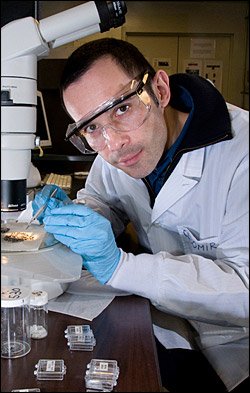Cedomir Petrovic, a physicist at the U.S. Department of Energy's (DOE) Brookhaven National Laboratory, has received the Marko Jaric Award for his outstanding achievements in physics. The award is presented each year by the Marko Jaric Foundation to preserve the memory of the life and work of the Serbian physicist for whom it is named. Petrovic received the award, which consists of a certificate and $3,000, on March 17, at the University of Belgrade, Serbia.
 Cedomir Petrovic
Cedomir Petrovic
Petrovic is one of the principal investigators in Brookhaven Lab's new Energy Frontier Research Center, one of 46 centers in the U.S. recently established by DOE to pursue advanced scientific research on energy. At the Brookhaven center, Petrovic and others perform research to understand the underlying nature of superconductivity in complex materials. Unlike ordinary conductors, superconductors carry current with zero resistance so that no energy is lost. Brookhaven researchers, including Petrovic, seek to improve the critical properties of superconducting materials and accelerate the search for new superconductors with the aim of improving the capacity, efficiency, and reliability of the electric grid.
The key challenge has been to develop superconductors that operate at temperatures that make them practical for the real world applications. Many known superconductors must be kept extremely cold. Petrovic makes new superconductors that can be used as models for experimental research. One of his most important achievements has been the synthesis and characterization of cerium-cobalt-indium, a superconductor with the highest known superconducting temperature among materials in its class. Petrovic designed and built his own laboratory for exploratory synthesis of new superconducting materials. In addition, he is a master at making extremely large, high-quality crystals of superconducting and related materials for experiments, and he holds the record for making the world's largest crystals of compounds of ytterbium-rhodium-silicon and cerium-cobalt-indium, important for neutron-scattering studies of these materials.
Petrovic earned a B.Sc. in theoretical physics from the University of Belgrade, Serbia, in 1996, and an M.Sc. and Ph.D. in physics from Florida State University in 1997 and 2000, respectively. He was a postdoctoral research associate at DOE's Ames Laboratory for two years before he joined Brookhaven Lab in 2002 as an assistant physicist. He worked through the ranks to become a tenured physicist in 2008. He is also an adjunct professor of physics at Johns Hopkins University.